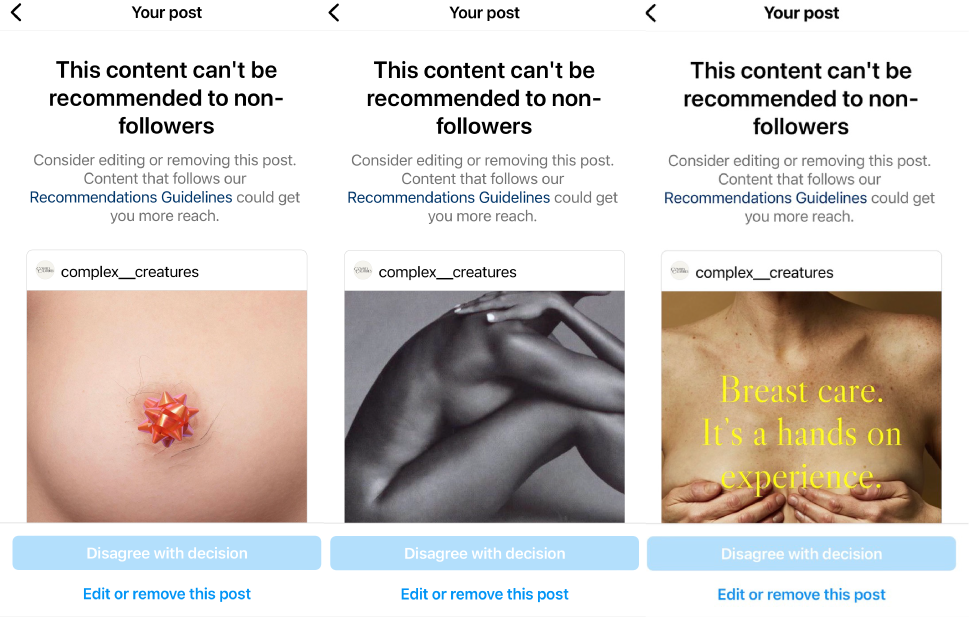
Teona Tsintsadze
Advertising erectile dysfunction pills? No problem. Breast health? Try again
It happened again last week. Lisa Lundy logged into her company’s Instagram account only to be greeted with yet another rejection. This one was an advertisement about breast cancer awareness, featuring a close-up of a woman’s bare decolletage with the caption: “90% of breast cancer diagnoses are not hereditary.”
Lundy thought the ad could educate social media users about the risk factors for breast cancer, but it never saw the light of day. Instead, Instagram rejected it for violating its policies on nudity and sexual activity.
For more than a year, Lundy’s company, Complex Creatures, has struggled to find a home for its content on Instagram. The platform has rejected scores of the company’s advertisements and posts since its account went live in June 2022. Lundy co-founded Complex Creatures with her sister, a breast cancer survivor, to raise awareness about the disease and provide health and wellness products for women undergoing breast cancer treatment. But the content rejections came rolling in as soon as she started posting. It didn’t take long for Lundy to realize that Meta, owner of Instagram, was nixing her content because of its subject matter: the breast.

“How do you desexualize the breast?” she asked. “It’s so much of what we’re trying to do.” But platforms like Instagram, Lundy said, “don’t want to let us.” In a call over Zoom, she shared some screenshots of her company’s censored content. One was a post about how massages can improve breast health, featuring a photo of a woman’s hands fully covering her breasts. “But they’re allowed to do this,” she sighed, pulling up an advertisement from a men’s health brand for an erectile dysfunction treatment containing an image of a hand clutching an eggplant with the caption: “Get hard.” The censorship, she added, “is an ongoing challenge. We’re talking about breast cancer and breast health.” Access to the right information about the disease and its risk factors, she explained, can be a matter of “life and death.”
The censorship that Lundy routinely confronts on Instagram is part of a deeper history at Meta, which has long faced criticism for censoring material about breasts on Facebook. But it’s not just breast-focused content that’s not getting through. Lundy belongs to a community of nonprofits and startups focused on women’s health that face routine — and often bewildering — censorship across Facebook and Instagram.

I spoke with representatives from six organizations focused on women’s health care globally, and they told me that while Meta regularly approves advertisements for material that promotes men’s sexuality and sexual pleasure, it regularly blocks them from publishing advertisements and posts about a wide range of health and reproductive services aimed at women, including reproductive health, fertility treatments and breast care. Often, these posts are rejected on the grounds that they violate the company’s advertising policies on promoting sexual pleasure and adult content.
This kind of censorship comes at an existential moment for the U.S.-based reproductive rights community after the Supreme Court’s overturning of Roe v. Wade — the nearly 50-year-old ruling that legalized abortion across the U.S. — in 2022. As I reported in March 2023, abortion opponents have sought to clamp down on abortion speech online in the post-Roe era, introducing policies in Texas, Iowa, and South Carolina that would prohibit websites from publishing information about abortion. That’s on top of censorship that reproductive rights groups already face when they try to post content about accessing abortion care on platforms like Instagram and Facebook — even in countries where the procedure is legal.
According to Emma Clark Gratton, a communications officer for the Australia chapter of the international reproductive health nonprofit MSI Reproductive Choices, the organization is routinely blocked from running ads about abortion services on Facebook, often for violating the company’s advertising policy on social issues, elections, and politics. Abortion is “totally legal” in Australia, Clark Gratton explained, but on Meta’s platforms, it is “still very restricted in terms of what we can post.” The organization’s clinical team in Australia, she added, can advertise for vasectomy services on Facebook, “but they definitely couldn’t do an ad promoting abortion services, which is literally what they do. They’re an abortion provider.”
Women First Digital, a group that provides information resources about abortion globally, has dealt extensively with restrictions on social media networks. Michell Mor, a digital strategy manager with the organization, put it to me this way: “Because big tech is from the United States, everything that happens there is replicated around the world.”
The impact of these restrictions reaches well beyond social media, says Carol Wersbe, chief of staff for the Center for Intimacy Justice, a nonprofit that has been tracking Meta’s rejections of health-related ads.
“Advertising represents so much more than just a company getting an ad on Facebook,” Wersbe told me. “It’s visibility, access to information. If we can’t advertise for things like pelvic pain and endometriosis, how do we ever reduce the stigma from those topics?”
In January 2022, the Center for Intimacy Justice published a survey of 60 women’s healthcare startups about their experiences with censorship on Facebook and Instagram. The participating companies offer products and services for a range of women’s healthcare needs, from fertility and pregnancy support to postpartum recovery, menstrual health, and menopause relief. All of the companies surveyed reported having their ads rejected by Instagram and Facebook, and half said their accounts were suspended after Meta removed their ads. According to the report, ads were frequently taken down after they were flagged for promoting “adult products and services,” which are not permitted under the company’s advertising policies.
Some ads that didn’t make the cut featured products to relieve side effects of menopause; another included background about consent in school sexual education courses. During the same time period, the report points out, Meta approved ads for men’s sexual health products, including treatments for premature ejaculation, erectile dysfunction pills promising to help consumers “get hard or your money back” and men’s lubricants to “level up your solo time.” The platform allowed these ads despite its own rules prohibiting ads from promoting products and services that “focus on sexual pleasure.”
Meta quietly updated its advertising guidelines after the report came out, stating that ads for family planning, contraception, menopause relief, and reproductive health care are allowed. Though the social media giant expanded the scope of permissible advertisements on paper, Wersbe says the status quo remains unchanged. “Across the board, we’re still seeing our partners experiencing rejections,” she explained. The censorship that she and others in the field are observing cuts across languages, markets, and continents. “Facebook’s ads policy is a global policy, so when it changes something it affects their whole user base,” explained Wersbe. “We’ve seen rejections in Arabic, Spanish, French, Swedish, Swahili. It’s really pervasive.”
In March 2023, the organization filed a complaint with the U.S. Federal Trade Commission, urging the agency to investigate whether Meta is engaging in deceptive trade practices by rejecting ads from women’s health organizations that comply with its stated advertising policies, while allowing similar advertisements promoting men’s sexual health. The complaint alleges that the social media giant is unevenly applying its ads rules based on the gender of the target audience. These removals, it argues, constitute discriminatory censorship and perpetuate “inequality of access to health information and services for women and people of underrepresented genders.”
In reporting this story, I contacted Meta with questions about the Center for Intimacy Justice’s report, the Federal Trade Commission complaint, and the rejection of Lundy’s advertisements. A spokesperson responded and shared the company’s published Community Standards, but declined to comment on the record.
Alexandra Lundqvist told me that alongside the outreach challenges that these issues create, ad rejections also make it harder for women-led health companies to get a leg up among investors. Lundqvist is a communications lead with The Case for Her, an investment firm that funds women’s sexual health organizations worldwide, including the Center for Intimacy Justice. “The general Silicon Valley big tech investor is not going to go to a women’s health company, especially when they can’t really advertise their work because they get blocked all the time. When these companies can’t advertise their work, they can’t scale, they can’t get funding,” Lundqvist explained. That exacerbates inequities that women and nonbinary entrepreneurs already face in securing investments from the male-dominated venture capital industry, creating a negative feedback loop for companies marketing products by and for women. “There is a big systems impact,” she added.
Lundy, who says her breast health company continues to experience widespread rejections despite Meta’s policy update, believes the censorship has a corrosive effect on consumers and creators alike. The content takedowns make it harder for entrepreneurs like herself to reach customers, make money, and attract investors. But they also prevent people from learning potentially life-saving information about breast cancer.
“There’s not a lot of information out there about breast health,” she said, describing her own lack of awareness about the disease prior to her sister’s diagnosis at age 37. “We had no family history,” she told me. “Her gynecologist missed it and she had never had a mammogram.” The experience, she continued, “really illuminated how much we didn’t know about our breasts.”
Lundy and her sister founded the company in part to address the information vacuum that left them both in the dark — to reach people before diagnosis and support those with the disease through treatment. But Meta makes that mission harder. “We want to normalize the breast,” she said, “but it’s almost like the algorithm and the people making the algorithms can’t think about a breast or a woman’s body in any way other than sexuality or arousal.” The censorship that Complex Creature routinely faces for posting material on Instagram about breast health, Lundy told me, “feels like the patriarchal system at work.”
The morning after our call, Lundy emailed me an update: a photo of two squashes meant to resemble breasts hanging side by side — the visual for an Instagram ad about her company’s summer sale. The post, she wrote, “was rejected last night. They’re gourds.”
The story you just read is a small piece of a complex and an ever-changing storyline that Coda covers relentlessly and with singular focus. But we can’t do it without your help. Show your support for journalism that stays on the story by becoming a member today. Coda Story is a 501(c)3 U.S. non-profit. Your contribution to Coda Story is tax deductible.
















